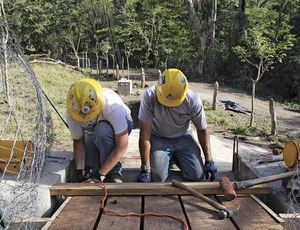
Kiewit Corp. has joined a growing list of major engineering and construction firms volunteering with the group Bridges to Prosperity. Earlier this year, Kiewit completed its first project, a week-long effort to construct a steel-and- wood-deck suspension bridge 115 ft—with tower heights of 25 ft—across the El Limón River in Nicaragua.
Kiewit isn't alone. Both CH2M Hill and PCL will volunteer for their first projects this year, while existing industry partners, such as Flatiron and Arup—there are now about 30—are planning more projects, as well.
Like so many of the non-profit's 130 projects in 15 countries built so far, the Nicaraguan bridge helps connect the small community of Cinta Verde to schools, medical care and retail markets, providing safe year-round access for the 300 residents and a chance to improve their economic standing.
"To us, this is a small bridge," says Kiewit's Jeronimo Cruz, one of its nine bridge volunteers. "To the community, this is a bridge to a better way of life."
Led by Kiewit's Ralph Salamie from the Omaha-based firm's Vancouver, Wash., office, the team of Kiewit employees from across North America collaborated with two members of subcontractor firm International Bridge Technologies.
Salamie initiated Kiewit's involvement after talking with Avery Bang, Bridges to Prosperity chief operating officer, at a bridge conference. From there, he says it was pretty easy, since 44 people from Kiewit volunteered to go. "We want to help with a bridge—tell us where to go," he says. "It didn't really matter where. I'm encouraged that there will be other opportunities. It is an opportunity to help people in a different way. Hopefully, it catches on."
The volunteers paid their own travel expenses and used their own paid time off. Kiewit and IBT paid for planning and materials. The project started with Kiewit-IBT leading the charge and up to 10 community members simply hoping to help. Eventually, the community members were doing the bulk of the hands-on work on the 4-ft-wide crossing, dubbed a "baby Tacoma Narrows."
With 100,000 such bridges needed worldwide, completing an average of 32 bridges a year isn't going to be the end solution, says Bang, who notes the group has staff in five countries. Instead, the Denver-based non-profit is working with industry partners to create training manuals and teach local governments how to replicate projects.
Eventually, Bang hopes to have locals producing 100 projects a year in Nicaragua and the other 17 countries in which the volunteers have built bridges. That would allow the North American teams to move into new countries to restart the process.
"Now, the municipalities are coming to us," Bang says. "It is not about us building but transferring knowledge."













Post a comment to this article
Report Abusive Comment